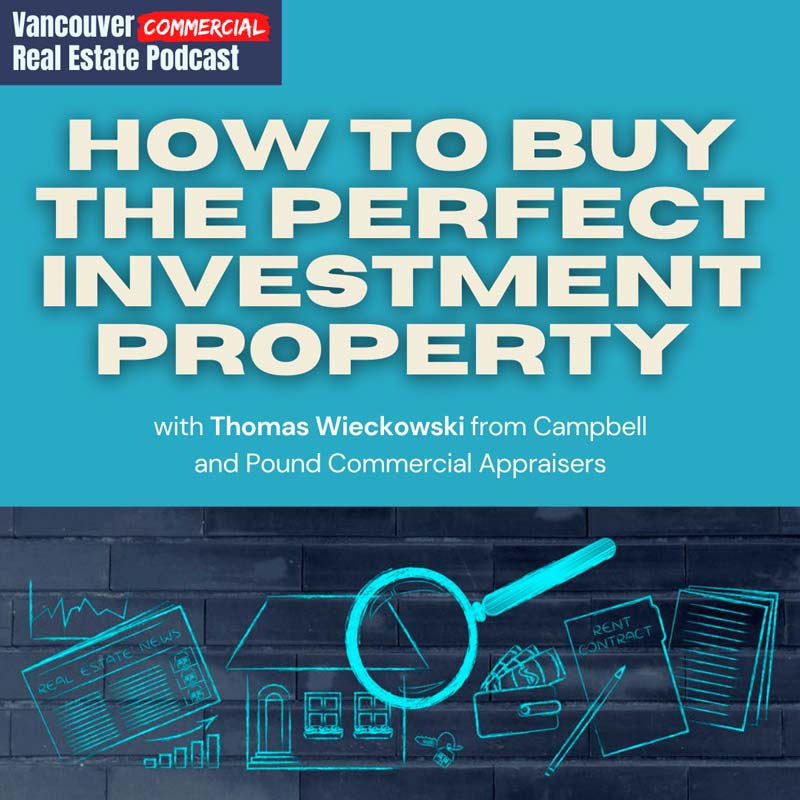
Powered by RedCircle
Ever wonder how an appraiser or bank views your purchase? This week Cory welcomes Thomas Wieckowski from Campbell & Pound Commercial Appraisers to break down the appraisal process, how to value risk, and how a bank views your property. A must listen to episode if you are thinking of buying or have purchased commercial real estate to ensure you get the best value for your dollar. Thomas sheds some great insight for your next commercial purchase and what to consider during the offer process!
Please tell us about yourself.
I was born in Ottawa and moved to Calgary as a kid. We then moved to the Lower Mainland in 1988 and have been here ever since. I studied economics at UBC and have been in commercial real estate consulting and appraisal for more than 15 years.
Why appraising?
I fell into it. I was working at a bank in property insurance and had a friend who was working with Campbell and Pound. I looked at his lifestyle and was jealous of his freedom and flexibility. So I took a leap of faith and have been there ever since.
What is the goal of an appraisal?
It’s really to provide an unbiased, over the fence take of a question you’re trying to solve, most often a point-in-time valuation. Everybody involved in the transaction is a biased party because they have a financial stake in the project. The appraiser is supposed to give an unbiased assurance that the end product is commensurate with what the parties are saying.
We often get a call after there’s been an accepted offer. The appraiser is reviewing the market evidence and the pending contract to give assurance that it is, in fact, a market-value transaction.
Do you work from the agreed-upon purchase price?
The appraiser must give their opinion of any pending activity on the property. So reviewing the terms of the contract is a part of the process. But there are circumstances where parties want to have a completely unbiased view of what the property is worth. So I’ve done it both ways, but I’m usually reviewing a pending contract.
Where do you work?
My office works from Chilliwack to Whistler and we occasionally go into the Interior.
How do you stay on top of the local markets?
It’s more difficult in commercial than residential to specialize in a contained geographic area or product type, just because the number of deals is smaller. But it is important that the appraiser has experience with the property in question. With the Appraisal Institute of Canada, you develop a methodology that allows you to appraise a pretty wide scope of products. It’s not as difficult as you may think to keep your finger on the pulse of the local market.
What is the process and timeline?
Every property and engagement is unique but in general, it starts with a Letter of Engagement. That outlines the expectations for the assignment and the intended use of the report. You are defining what is happening, how long it will take and the costs from the get go. From there, you coordinate a property viewing and do a site inspection. The site inspection is only a small part of what’s happening; 95% of the work is sitting in front of spreadsheets and reviewing market evidence.
Typically, it takes anywhere from 5-10 business days for the delivery of a finished commercial appraisal product. Larger engagement can take up to 4-5 months.
How does the process differ by product type?
The process is essentially very similar, but the nuances of the analysis will differ. Every type of property has its own quirks. You may have to apply special treatments to larger or multi-use properties that you wouldn’t need on smaller and simpler properties.
If I’m renovating and repositioning a building, how does that factor into the appraisal?
This is a pretty common framework for appraisals. You would get two scenarios of valuation: 1) as is and 2) an estimate of potential value if a series of assumptions are realized. It’s pretty straightforward to provide both of these values, but it’s important to remember none of these assumptions have happened yet. The end-user must understand the scenario they’re dealing with and decide if they want to assume the risk.
If you’re planning on a value-add deal, the best thing you can do is have concise information before you get an appraisal report.
How do you evaluate pre-sale properties?
You’re looking at the pending contract and the developer’s proposed specifications and giving an estimate of value as if everything is complete. If you show up and things are halfway done, you give an estimate of what it would be worth if it was finished.
Are there common red flags that you see?
There can be so many things that tip you off. Over the years, you get a feel for something funny going on before you even visit the property. The most common thing I see is contracts that are not arm’s length. When you get that funny feeling, you start digging more closely and may end up discovering the property isn’t as described.
Who is your obligation to at the end of the day?
The obligation is to the client. In commercial real estate, the borrower ends up paying for the appraisal and is named as the client. But the intended user of the appraisal report is the bank. However, the bank is not the client and doesn’t have control over the appraisal process.
How does it work if a pre-sale is 2-3 years out?
Typically the appraisal process is initiated nearer to the closing date. Most lenders won’t accept an appraisal that is two years old. You will need to update the appraisal or commission a new one.
If you were buying right now, what would you be looking at?
The most astonishing gains that I have seen have been in land. That gives you maximum opportunity for appreciation. It’s been impressive to see how far values have come, most obviously in industrial land.
How many times have you seen someone write an offer for $1 million and you have to deliver the $500,000 appraisal?
It does happen and it’s never a fun conversation. I don’t ever feel comfortable being part of an engagement with information that I don’t think is true. Sometimes you have to be clear that the price is the result of a red hot market. You want to be clear about how far someone is stretching.
Giving bad news doesn’t happen that often – maybe once every couple of months. Sometimes people don’t take it well and sometimes they’re very appreciative.
Cory: Your lender gives you a loan based on the lesser of the two values: the contract or the appraisal. So if the appraisal value is lower, the bank is only going to give you a loan based on that lower value. It’s up to you as the buyer to come up with the rest of the money to hit the contract price. That’s why appraisals are such an important part of the process.
That’s why subject-free offers are so dangerous. You usually want to see 30-60 days of due diligence. But that can be the difference between a competitive offer and not. It’s not easy when the market is moving quickly.
How would a newcomer to commercial real estate establish value?
We don’t find most of the information on an MLS board like residential appraisers would. In commercial, you have a lower participation rate. We have specialized databases that track commercial sales exclusively. In addition, a commercial appraisal will involve primary research. The scope of market research will come from a variety of sources, which is the main difference between residential and commercial appraisals.
It seems you can’t establish value without a good broker and appraiser. Is that correct?
For sure. Your first contact should be with an experienced commercial broker who knows everything about the asset. You can’t walk in blind or trust the residential realtor in your neighbourhood. You need someone to help you with the deal who knows what they’re doing.
What is your advice for newcomers to commercial real estate?
Getting tripped up over due diligence and trying to cut corners over a few thousand dollars is going to be a poor strategy for most people.
Find out more: www.aicanada.ca & campbell-pound.com
Contact: [email protected]
For all the curious minds interested in commercial real estate investing, grab a coffee and pull up a chair because we have exclusive stories and tips from commercial real estate brokers, investors, developers, economists, urban planners, and everyone in-between. From the successes and failures to the motivations and lessons learned, the Vancouver Commercial Real Estate Podcast is your insight into commercial real estate in Vancouver, Victoria, Kelowna, and beyond.
What's the best real estate market to invest in? What are the commercial real estate asset classes and property types? Hosted by Cory Wright, founder of William Wright Commercial, and co-hosts Adam and Matt Scalena of the Vancouver Real Estate Podcast, our podcast opens the door to real estate investing for everyone from beginner investors to experienced real estate professionals. New episodes are released every Tuesday. Follow the Vancouver Commercial Real Estate Podcast on Apple Podcasts, Spotify, Google Podcasts, or your favourite streaming platforms.

This communication is not intended to cause or induce breach of an existing agency agreement. E&OE: All information contained herein is from sources deemed reliable, and have no reason to doubt its accuracy; however, no guarantee or responsibility is assumed thereof, and it shall not form any part of future contracts. Properties are submitted subject to errors and omissions and all information should be carefully verified. All measurements quoted herein are approximate.
ⓒ William Wright Commercial Real Estate Services 2024
Proudly designed by Burst Creative